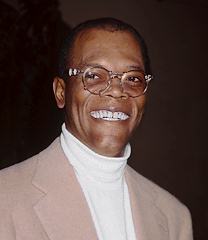 |
Sound Clip #1 Sound Clip #2 |
Samuel L. Jackson
Real Name: Samuel Leroy Jackson
Birthdate: December 21, 1948
Birthplace: Washington DC but raised in Chatnooga Tenn.
Education: Morehouse College, drama major
Family:
Quotes:
"What kills me is that everybody thinks I like jazz." --Samuel L. Jackson
"We all would like to think that we're here for some greater purpose. And I'm blessed in that I was able to gather a lot of information during that down time, and hold on to it." -- Samuel L. Jackson
1991: Cannes Film Festival Special Jury Prize Award for Best Supporting Performance for Jungle Fever.
1991: New York Film Critics Circle Award for Best Supporting Actor for Jungle Fever.
1994: Society of Texas Film Critics Award for Best Actor for Pulp Fiction.
1994: Independent Spirit Award for Best Actor for Pulp Fiction.
A consummate professional, Samuel L. Jackson put in years of work with small roles in small movies before a young director by the name of Quentin Tarantino turned him into a Jherri-curled superstar and a hollywood big shooter.
It took almost twenty years for American audiences to finally put a name
to Samuel L. Jackson's face. Born in Washington D.C. on December 21, 1948, the
actor was raised in Chatanooga Tennessee. Growing up, Jackson was plagued by a
stutter. He first got into acting after his speech therapist suggested that
auditioning for the college play might help him get over the impediment. It
worked, and Jackson soon switched his major at Morehouse University to Drama.
While attending the University, Jackson became active in Civil Rights causes,
and was expelled from Morehouse for participating in a student demonstration.
However, the school took him back, and he graduated in 1972. Soon after, he
moved to New York to become a star.
He received some early acclaim working with the Negro Ensemble Company of New
York, and appeared in diverse theater productions. While it offered paychecks,
the money was still rather tight for the struggling actor. Other, slightly
bigger, paychecks came when Jackson landed a job filling in for Bill Cosby on
his hit 80s sitcom The Cosby Show. Jackson's job was to keep the audience
entertained between breaks.
Jackson had also worked in movies, and had made his debut in the 1976 television
movie, The Displaced Person. From there it took five years for Jackson to
log his second credit, "Gang Member No. 2" in 1981's Ragtime.
Jackson's work over the next years continued to be mostly in minute roles,
"Hold-Up Man" in Coming to America, and "Black Guy"
in Sea of Love.
The only man who would give him any real work was director Spike Lee, who cast
Jackson in such films as Do the Right Thing and Jungle Fever. The
two hit it off after Lee saw Jackson perform in a presentation of A Soldier's
Story. Jackson had long been a fan of the stage and had garnered a good deal
of success off Broadway. When he later had the opportunity to be the lead in a
version of August Wilson's Two Trains Running on Broadway, he lost his
job. The producers were apparently scared off by Jackson's growing addictions to
booze and crack cocaine.
Losing the role was a wake-up call - and Jackson soon began to get his life in
order. Ironically, his first role as a clean and sober actor was in Jungle
Fever, playing the crack addicted brother of Wesley Snipes' character. There
was already a notable difference in Jackson's capabilities. He won a special
prize at the Cannes Film Festival for Best Supporting Actor, a category they had
never recognized before.
Better roles followed, and gradually audiences began to recognize Samuel L. Jackson's face. However, it was 1994's Pulp Fiction which really blew audiences away. The actor nabbed a Best Supporting Actor nomination for his turbulent role as a Bible-quoting hitman who thinks he's witnessed a miracle and wants out of the business. Thanks to Quentin Tarantino, Samuel L. Jackson was now a star.
Jackson followed up with a fun turn in Bruce Willis'
sequel, Die Hard With a Vengeance and a powerhouse performance in John
Grisham's A Time to Kill. Since then, he has gone on to become one of
Hollywood's most popular leading men. His vivid energy comes across in
everything he does, and audiences can't seem to get enough. He has proven that
he can carry an action blockbuster - The Negotiator, and dazzle in
supporting roles - Jackie Brown.